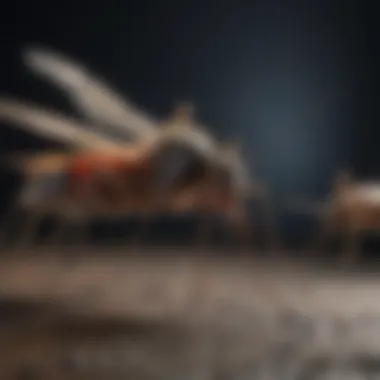Discover What Mosquitoes Hate: Key Insights


Intro
Mosquitoes are much more than just a nuisance. These tiny pests pose health risks, transmit diseases, and disrupt outdoor comfort. To exist comfortably in nature, understanding what mosquitoes hate is fundamental. This knowledge is key in preventing their presence and minimizing the discomfort they bring.
Understanding Pests
Definition of Pests
Pests are organisms that harm human activities, whether through direct impact on health or by damaging crops and surroundings. Mosquitoes belong to this group because their bites can carry harmful pathogens, making them a prominent concern in many areas.
Importance of Pest Identification
Identifying mosquitoes is crucial. Recognizing their breeding grounds and patterns helps in areas where they flourish. Not all mosquitoes are equal; some species are more aggressive in certain conditions than others.
When homeowners understand species behavior, they can better tailor prevention efforts. Knowing what drives mosquitoes away can significantly reduce their numbers in your vicinity.
Prevention Techniques
Home and Garden Preventative Measures
Creating a mosquito-free environment begins at home. Here are effective measures:
- Remove Standing Water: Mosquitoes breed in stagnant water. Regularly check for any containers, gutters, or ponds that can collect rainwater.
- Install Screens: Properly fitting screens on doors and windows can prevent mosquitoes from entering the house.
- Maintain Yard: Regularly mow the lawn and trim bushes. Dense foliage provides a resting place for adult mosquitoes.
- Plant Repellent Plants: Some plants, like lavender and citronella, naturally repel mosquitoes.
Seasonal Prevention Tips
Seasonal changes can affect mosquito populations. Early spring irrigation and summer warmth often boost mosquito activity. Regular practices include:
- Plan Ahead: Use repellents and traps as soon as the weather turns warm.
- Monitor Weather Conditions: Use local weather reports to predict high mosquito activity periods.
- Outdoor Schedule Adjustments: Limit outdoor activities during dawn and dusk, which are prime feeding times for mosquitoes.
Eco-Friendly Pest Control Solutions
Overview of Sustainable Practices
Utilizing eco-friendly solutions not only protects your family but also respects the environment. Here are sustainable techniques:
- Biological Control: Introducing natural predators, such as fish that eat mosquito larvae, can effectively limit their growth.
- Natural Barriers: Installing bat houses can attract bats, which consume a large quantity of mosquitoes.
Natural Remedies and Their Effectiveness
Natural repellents can serve as effective alternatives to chemical solutions. Some notable options are:
- Essential Oils: Oils like eucalyptus and tea tree can be mixed with carrier oils to create DIY repellents.
- Vinegar Mixtures: Results show that vinegar can deter mosquitoes if sprayed in areas of concern.
Utilizing these strategies helps one maintain comfort during outdoor activities, allowing for enjoyment without the distress of these pests. Collectively, this comprehensive understanding of mosquitoes and effective prevention methods will empower readers.
"Knowledge of what repels mosquitoes is crucial in enhancing outdoor experiences and safeguarding health."
Preface to Mosquito Behavior
Understanding mosquito behavior is crucial in developing effective strategies to repel these pests. This section delves into the evolution of mosquitoes and the dynamics of attraction versus repulsion. Knowing why mosquitoes behave the way they do can guide homeowners to implement more successful deterrents.
The Evolution of Mosquitoes
Mosquitoes have existed for millions of years. Their adaptation skills are remarkable. They have survived through various environmental changes and have developed complex behaviors. These behaviors include specific feeding patterns and seasonal activity variations. Each species of mosquito also carries its unique traits, shaped by genetic adaptation.


One significant evolutionary trait is their ability to locate hosts. Mosquitoes can sense carbon dioxide and body heat, which indicates the presence of potential blood meals. Their compounds in saliva can keep their host unaware of the bite, allowing for a stealthier approach. Understanding these evolutionary traits helps in grasping their behavior and, importantly, what might repel them.
Understanding Attraction vs. Repulsion
Attraction and repulsion are key concepts in managing mosquito presence. Various elements in the environment influence these responses. Specifically, scents play a significant role. Mosquitoes are attracted to smells produced by sweat, carbon dioxide, and certain skin bacteria. Knowledge of these preferences is vital for creating repellent strategies.
Factors contributing to mosquito attraction include:
- Carbon dioxide emitted from breath
- Lactic acid in perspiration
- Specific body odors that vary per individual
Conversely, understanding what mosquitoes dislike can assist in driving them away. There are numerous natural and synthetic repellents available. Many homeowners may prefer using essential oils or planting certain species of plants that help deter mosquitoes. Creating an environment that minimizes attractants while maximizing repellents can significantly reduce mosquito activity.
"A thorough understanding of mosquito behavior often leads to more effective repellents and control methods."
By comprehending the nuances of attraction versus repulsion, homeowners can take actionable steps toward mitigating the discomfort caused by mosquitoes, enhancing outdoor experiences and comfort.
Chemical Compounds That Repel Mosquitoes
The use of chemical compounds to deter mosquitoes is crucial in understanding how to effectively manage their population and lessen their nuisance. Various chemicals can interact with mosquitoes on different levels, providing varying degrees of protection. Knowing these compounds helps individuals select the most suitable options for personal use or home environments. These choices can not only keep mosquitoes at bay but also ensure safety and comfort during outdoor activities, improving overall quality of life.
Essential Oils and Their Efficacy
Essential oils represent a natural method to repel mosquitoes. They offer benefits for those who prefer non-synthetic repellents. The efficacy of these oils generally comes from their strong aroma, which can mask scents that attract mosquitoes.
Citronella
Citronella oil is derived from the leaves and stems of the lemongrass plant. Its main characteristic is its strong citrus scent, which is often regarded as pleasant by humans but repugnant to mosquitoes. Citronella is considered a popular choice in the realm of natural repellents. Its unique feature lies in its ability to blend well with other oils, further enhancing its effectiveness. However, its disadvantages include a shorter duration of protection when compared to synthetic options, necessitating more frequent applications. Therefore, while citronella is an excellent natural alternative, users must remain vigilant to reap the benefits fully.
Eucalyptus
Eucalyptus oil, extracted from the leaves of eucalyptus trees, has notable repelling qualities against mosquitoes. This oil contains compounds like citronellal, which actively hinders mosquito attraction. Eucalyptus is recognized for its effectiveness and is a favorite among many seeking natural remedies. A unique aspect of eucalyptus oil is its strong scent, which some may find overpowering. While it works as a beneficial repellent, its strong aroma might not be suitable for everyone. Additionally, eucalyptus oil should be diluted before application to avoid skin irritation.
Lavender
Lavender oil is well-known for its calming properties, but it also serves as an effective mosquito repellent. The distinct floral scent is generally appreciated, making it a favorable option for many users. A key characteristic of lavender is its dual purpose: providing both relaxation and mosquito deterrence. Moreover, lavender contains compounds that can repel insects while soothing skin irritations. Despite its advantages, some may find that its effectiveness is less potent than other options. Thus, while lavender can be a pleasant and functional choice, users may need to combine it with other repellents for maximum protection.
Synthetic Repellents: DEET and Alternatives
Synthetic repellents, particularly DEET, have been widely used for many years and have shown effective results. Their strength and long-lasting nature make them essential for environments with high mosquito populations. However, understanding the background of these compounds and exploring newer alternatives can provide more options.
History of DEET
DEET (N,N-Diethyl-meta-toluamide) was developed by the U.S. Army in 1946. Its primary goal was to protect military personnel in insect-infested regions. Over the decades, DEET has gained recognition as a reliable mosquito repellent due to its ability to provide long-lasting protection. The unique feature of DEET is its versatility; it can be used on skin, clothing, and gear without diminishing its effectiveness. Notably, some concerns exist regarding potential skin irritation and its strong odor. While DEET remains a strong choice for mosquito defense, proper usage is important to maximize benefits and limit side effects.
Newer Synthetic Options
New synthetic repellents have emerged as alternatives to DEET. Compounds like Picaridin and IR3535 offer effective solutions without some of the drawbacks associated with DEET. These newer options generally provide long-lasting protection without the greasy feeling or strong odor common with DEET. Picaridin, for instance, mimics the natural compound found in black peppercorns, proving effective against various mosquito species. Though these alternatives are increasingly popular, users should remain aware of potential allergies or skin sensitivity that might arise. Overall, these newer options provide viable solutions for those looking to avoid DEET while still maintaining protection against mosquitoes.
Natural Remedies to Deter Mosquitoes
Natural remedies play a crucial role in mosquito deterrence for many households. The use of these alternatives is growing in popularity among people looking for non-toxic, environmentally friendly solutions. Given the increasing concerns about chemical pesticides and their potential health risks, exploring natural options becomes vital in creating a safe outdoor space. Natural remedies not only help in reducing mosquito presence but also enhance the aesthetic appeal of gardens and patios.
Plants That Mosquitoes Dislike
Plants can serve as both decorative elements and functional deterrents. Certain varieties possess intrinsic properties that repel mosquitoes effectively. By incorporating these plants into your garden or around your home, you can create a natural barrier against these pests.
Marigold


The marigold plant (Tagetes) is a popular choice for mosquito deterrence. It has a distinct scent that many find pleasant but is off-putting to mosquitoes. One of the key characteristics of marigold is its ability to produce a compound known as thiophene, known for its pesticidal properties.
Marigolds are beneficial due to their ease of growth and vibrant colors. They thrive in various conditions and can be planted directly in the ground or pots. A unique feature of marigolds is that they can deter not only mosquitoes but also other garden pests like aphids. However, marigold plants require regular watering and may not be suitable for every environment, particularly in extreme cold weather.
Basil
Basil (Ocimum basilicum) is another effective plant in repelling mosquitoes. Its aromatic leaves contain compounds that mosquitoes find repulsive. The essential oil derived from basil is particularly potent against these insects. Basil is a popular choice because it is not only functional but also culinary; it can be used in various dishes, adding extra value to its cultivation.
The unique feature of basil is its versatility. Gardeners can utilize it in cooking while simultaneously warding off mosquitoes. However, basil needs good sunlight and moisture to flourish, which means there's a responsibility to maintain its health to achieve the desired mosquito-repellent effect.
Catnip
Catnip (Nepeta cataria) stands out for its effectiveness. This herb is known for its strong ability to repel mosquitoes due to a compound called nepetalactone. Notably, studies suggest that catnip can be up to ten times more effective than DEET in certain applications.
Catnip is a beneficial choice for pest control because it is easy to grow and can attract many beneficial insects, such as butterflies. However, like basil, it needs plenty of sunlight and well-drained soil. The unique feature of catnip is that it can also attract cats, making it a delightful plant for cat owners but possibly problematic for maintaining a quiet outdoor space.
Homemade Repellent Recipes
Creating your own mosquito repellents can be a rewarding venture. It allows customization of ingredients and ensures that harmful chemicals are kept at bay. Using readily available ingredients helps in crafting efficient solutions. Here are some simple recipes:
- Essential Oil Spray: Mix witch hazel with essential oils such as eucalyptus or lavender in a spray bottle. This combination not only smells good but also effectively repels mosquitoes.
- Vinegar-Based Solution: Combine vinegar with water in a 1:1 ratio and add a few drops of lemon juice. This natural concoction can be used on skin with proper tests for sensitivity.
- Herbal Infusion: Steep fresh herbs like basil, rosemary, or mint in oil. Once cooled, strain and use it as a skin application.
Always do a patch test before applying any homemade repellent on your skin.
These remedies exemplify how simple ingredients can contribute to creating a mosquito-free environment. By using natural remedies, homeowners can enjoy their outdoor spaces effectively and safely.
Environmental Conditions That Influence Mosquito Activity
Understanding how environmental conditions influence mosquito activity is critical in managing their presence. Certain factors, such as temperature and humidity, can enhance or reduce mosquito activity levels. These elements not only influence when mosquitoes are most active but also how effective their breeding cycles are. Therefore, recognizing these factors allows individuals to better prepare and implement strategic measures against mosquito intrusion.
Temperature and Humidity Factors
Temperature plays a significant role in mosquito activity. Most species thrive in warm conditions, typically between 70°F and 85°F (21°C to 29°C). When temperatures drop below this range, their activity often decreases, reducing the risk of an encounter. This means that during cooler parts of the year, particularly in northern regions, homeowners may experience fewer mosquito issues than in warmer months.
Humidity also interacts closely with temperature. Mosquitoes prefer environments with high humidity, often above 60%. This is because higher moisture levels aid in their survival and reproduction rates. Consequently, tropical climates or areas near large water bodies often experience a higher mosquito population.
To minimize mosquito activity in humid conditions, homeowners can:
- Use fans: Wind can create an unfavorable environment for mosquitoes, making it challenging for them to fly and find hosts.
- Monitor local weather: Awareness of humidity levels can help in planning outdoor activities. Choose times when humidity is lower to be outside.
Water Sources as Breeding Grounds
Water sources are critical to the life cycle of mosquitoes. Standing water is an essential breeding site. Mosquitoes lay their eggs in areas where water collects, such as birdbaths, clogged gutters, and flower pots. Even small amounts of stagnant water can become breeding grounds.
To combat this issue, homeowners can take proactive steps, such as:
- Regularly clean gutters to prevent debris build-up that can trap water.
- Empty and refresh birdbaths weekly to disrupt the breeding cycle.
- Ensure proper drainage in gardens or yards to avoid pooling water.
- Use larvicides in larger bodies of water to target mosquito larvae before they mature.
By recognizing that standing water is an invitation for mosquitoes, we can take necessary actions to mitigate their breeding opportunities.
Understanding these environmental factors can significantly contribute to reducing the presence of mosquitoes. The more informed homeowners are about the conditions that favor these pests, the better equipped they will be to manage and diminish discomfort caused by them.
The Role of Genetics in Mosquito Behavior
Genetics play a significant role in the behavior of mosquitoes, influencing their attraction to humans, ability to reproduce, and resistance to various control methods. Understanding the genetic basis of mosquito behavior can offer insights into how best to combat these pests. This section will explore genetic modifications for controlling mosquito populations and the concept of genetic resistance.
Genetic Modifications for Control


Genetic modifications in mosquitoes have been researched extensively as a method to reduce their numbers. Techniques such as CRISPR-Cas9 allow scientists to edit genes in mosquito DNA, which can affect reproduction and survival rates. This approach aims to introduce genes that either sterilize male mosquitoes or make them less able to transmit diseases like malaria and dengue fever.
One prominent project involves releasing genetically modified male mosquitoes into the wild. These males mate with wild females, and the resulting offspring do not survive to maturity. This method has shown promising results in reducing local mosquito populations in select regions. The success of such programs demonstrates the potential of genetic engineering as a tool for vector control.
Understanding Genetic Resistance
Genetic resistance refers to the ability of some mosquito populations to survive insecticides or repellents. Over time, as certain individuals survive spraying, they can pass their resistant genes onto their offspring. This cycle creates a population that is increasingly difficult to control with standard methods.
Resistance can arise from various factors such as genetic mutations or selective pressures in the environment. For instance, mosquitoes that are exposed repeatedly to a particular insecticide may develop mutations that confer survival advantages.
"Genetic resistance in mosquitoes highlights the need for adaptive pest management strategies."
Some key points to consider about genetic resistance include:
- Monitoring: It is crucial to monitor mosquito populations to determine if resistance is developing.
- Diverse Control Methods: Employing a combination of control strategies can help reduce the risk of resistance.
- Community Involvement: Engaging local communities in understanding genetic resistance can improve compliance with control measures.
Practical Strategies for Homeowners
Mosquito control can be a significant concern for homeowners. Understanding practical strategies can help mitigate the annoyance brought by these pests. Good practices focus on both prevention and active deterrence. Implementing these strategies can lead to a more enjoyable outdoor experience and can enhance overall home comfort.
Creating a Mosquito-Free Zone
Establishing a mosquito-free zone begins with careful planning and maintenance. The first step is to inspect your property for standing water. Mosquitoes breed in stagnant water, so removing any containers or debris that collect water is essential. This can include anything from flower pots to discarded tires.
Planting mosquito-repelling plants can also be effective. Plants such as citronella, lavender, and marigold emit natural scents that repel these insects. Furthermore, consider setting up screens on windows and doors to block mosquitoes from entering your home.
Using Environmental Changes to Deter Mosquitoes
Modifying the environment around your home can significantly reduce mosquito populations. This involves targeted actions that not only address water sources but also alter the habitat in which mosquitoes thrive.
Landscape Management
Effective landscape management is crucial in mosquito control. Overgrown vegetation can serve as a refuge for mosquitoes. Regular trimming of shrubs and grasses helps eliminate dark, damp areas where they might hide. Additionally, maintaining a well-drained yard can prevent water from pooling, thereby reducing breeding sites.
A key characteristic of landscape management is the choice of plants. Selecting flora known for their repellant properties serves a double purpose: it beautifies the area while also protecting against insects. This practice is not only beneficial but also popular among homeowners seeking eco-friendly pest control options.
The unique feature of landscape management is that it promotes a balanced ecosystem. However, it requires diligence and regular maintenance. Neglecting the yard can result in a resurgence of mosquito populations.
Water Feature Maintenance
Water features, such as ponds or fountains, can attract mosquitoes if not properly maintained. If you have a decorative pond, consider adding fish like goldfish or minnows that feed on mosquito larvae. Regularly changing and cleaning the water in fountains is also advisable to keep them from becoming breeding grounds.
The key characteristic of water feature maintenance is its dual role. While these features enhance the aesthetic of outdoor spaces, they also demand attention to prevent them from attracting mosquitoes. Homeowners can benefit by attracting beneficial wildlife while managing mosquito populations effectively.
A unique feature of maintaining water features lies in the consistency of care required. While it can be time-consuming, the advantages include a prettier landscape and a reduction in mosquito populations.
By applying these practical strategies, homeowners can create a more comfortable outdoor living space. Becoming informed and proactive about mosquito deterrents will ensure that outdoor enjoyment is not disrupted by these relentless pests. Moreover, practical changes can lead to long-term benefits and ultimately contribute to a healthier environment.
Finale: Best Practices to Keep Mosquitoes at Bay
In the fight against mosquitoes, understanding effective practices is crucial for homeowners aiming to create a comfortable outdoor space. The strategies discussed throughout this article highlight the multifaceted nature of mosquito control. Utilizing scents, adapting environmental conditions, and considering genetic implications results in a holistic approach to mitigating these pests. Each practice not only aims to repel mosquitoes but also fosters a more pleasant habitat for families and guests.
Recap of Key Findings
The exploration of mosquito behavior has unveiled several key findings that can aid in prevention efforts:
- Chemical Compounds: Natural and synthetic repellents are effective tools. For instance, citronella, eucalyptus, and DEET have shown significant to moderate efficacy depending on the application.
- Environmental Modifications: Landscapes can be tailored to deter mosquitoes. Simple adjustments like eliminating standing water can disrupt their breeding cycles.
- Plant Choices: Incorporating specific plants like marigold and basil not only beautifies a garden but also reduces mosquito presence.
- Genetics: Advances in understanding genetic resistance provide new avenues for controlling populations. Genetic modifications may contribute to future solutions for pest management.
Future Perspectives on Mosquito Control
As we move forward, it is essential to stay abreast of emerging techniques and practices in mosquito control. Research into genetic modifications may lead to more sustainable pest management strategies. Additionally, the ongoing development of herbal and plant-based repellents promises a future where chemical dependence diminishes, making outdoor spaces safer for families.
Innovations may come from collaborative efforts in science, agriculture, and public health sectors, ensuring that the fight against mosquitoes adapts to their evolving behaviors. A proactive approach, informed by current research and community engagement, will be integral in shaping effective strategies. By being informed and prepared, homeowners can navigate the challenging landscape of mosquito control and enhance their outdoor experiences.



